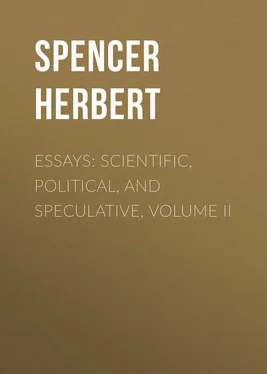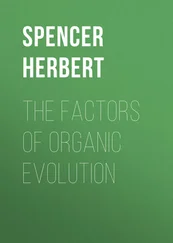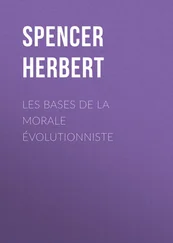Herbert Spencer - Essays - Scientific, Political, and Speculative, Volume II
Здесь есть возможность читать онлайн «Herbert Spencer - Essays - Scientific, Political, and Speculative, Volume II» — ознакомительный отрывок электронной книги совершенно бесплатно, а после прочтения отрывка купить полную версию. В некоторых случаях можно слушать аудио, скачать через торрент в формате fb2 и присутствует краткое содержание. Жанр: Философия, foreign_antique, foreign_prose, sketch, на английском языке. Описание произведения, (предисловие) а так же отзывы посетителей доступны на портале библиотеки ЛибКат.
- Название:Essays: Scientific, Political, and Speculative, Volume II
- Автор:
- Жанр:
- Год:неизвестен
- ISBN:нет данных
- Рейтинг книги:5 / 5. Голосов: 1
-
Избранное:Добавить в избранное
- Отзывы:
-
Ваша оценка:
- 100
- 1
- 2
- 3
- 4
- 5
Essays: Scientific, Political, and Speculative, Volume II: краткое содержание, описание и аннотация
Предлагаем к чтению аннотацию, описание, краткое содержание или предисловие (зависит от того, что написал сам автор книги «Essays: Scientific, Political, and Speculative, Volume II»). Если вы не нашли необходимую информацию о книге — напишите в комментариях, мы постараемся отыскать её.
Essays: Scientific, Political, and Speculative, Volume II — читать онлайн ознакомительный отрывок
Ниже представлен текст книги, разбитый по страницам. Система сохранения места последней прочитанной страницы, позволяет с удобством читать онлайн бесплатно книгу «Essays: Scientific, Political, and Speculative, Volume II», без необходимости каждый раз заново искать на чём Вы остановились. Поставьте закладку, и сможете в любой момент перейти на страницу, на которой закончили чтение.
Интервал:
Закладка:
Now, if we believe with Hegel, first, that thought is the true essence of man; second, that thought is the essence of the world; and that, therefore, there is nothing but thought; his classification, beginning with the science of pure thought, may be acceptable. But otherwise, it is an obvious objection to his arrangement, that thought implies things thought of – that there can be no logical forms without the substance of experience – that the science of ideas and the science of things must have a simultaneous origin. Hegel, however, anticipates this objection, and, in his obstinate idealism, replies, that the contrary is true. He affirms that all contained in the forms, to become something, requires to be thought; and that logical forms are the foundations of all things.
It is not surprising that, starting from such premises, and reasoning after this fashion, Hegel finds his way to strange conclusions. Out of space and time he proceeds to build up motion , matter , repulsion , attraction , weight , and inertia . He then goes on to logically evolve the solar system. In doing this he widely diverges from the Newtonian theory; reaches by syllogism the conviction that the planets are the most perfect celestial bodies; and, not being able to bring the stars within his theory, says that they are mere formal existences and not living matter, and that as compared with the solar system they are as little admirable as a cutaneous eruption or a swarm of flies. 1 1 It is curious that the author of “The Plurality of Worlds,” with quite other aims, should have persuaded himself into similar conclusions.
Results so absurd might be left as self-disproved, were it not that speculators of this class are not alarmed by any amount of incongruity with established beliefs. The only efficient mode of treating systems like this of Hegel, is to show that they are self-destructive – that by their first steps they ignore that authority on which all their subsequent steps depend. If Hegel professes, as he manifestly does, to develop his scheme by reasoning – if he presents successive inferences as necessarily following from certain premises; he implies the postulate that a belief which necessarily follows after certain antecedents is a true belief; and did an opponent reply to one of his inferences that, though it was impossible to think the opposite, yet the opposite was true, he would consider the reply irrational. The procedure, however, which he would thus condemn as destructive of all thinking whatever, is just the procedure exhibited in the enunciation of his own first principles. Mankind find themselves unable to conceive that there can be thought without things thought of. Hegel, however, asserts that there can be thought without things thought of. That ultimate test of a true proposition – the inability of the human mind to conceive the negation of it – which in all the successive steps of his arguments he considers valid, he considers invalid where it suits his convenience to do so; and yet at the same time denies the right of an opponent to follow his example. If it is competent for him to posit dogmas which are the direct negations of what human consciousness recognizes; then is it also competent for his antagonists to stop him at any moment by saying, that though the particular inference he is drawing seems to his mind, and to all minds, necessarily to follow from the premises, yet it is not true, but the contrary inference is true. Or, to state the dilemma in another form: – If he sets out with inconceivable propositions, then may he with equal propriety make all his succeeding propositions inconceivable ones – may at every step throughout his reasoning draw the opposite conclusion to that which seems involved.
Hegel’s mode of procedure being thus essentially suicidal, the Hegelian classification which depends upon it, falls to the ground. Let us consider next that of M. Comte.
As all his readers must admit, M. Comte presents us with a scheme of the sciences which, unlike the foregoing ones, demands respectful consideration. Widely as we differ from him, we cheerfully bear witness to the largeness of his views, the clearness of his reasoning, and the value of his speculations as contributing to intellectual progress. Did we believe a serial arrangement of the sciences to be possible, that of M. Comte would certainly be the one we should adopt. His fundamental propositions are thoroughly intelligible; and, if not true, have a great semblance of truth. His successive steps are logically co-ordinated; and he supports his conclusions by a considerable amount of evidence – evidence which, so long as it is not critically examined, or not met by counter evidence, seems to substantiate his positions. But it only needs to assume that antagonistic attitude which ought to be assumed towards new doctrines, in the belief that, if true, they will prosper by conquering objectors – it needs but to test his leading doctrines either by other facts than those he cites, or by his own facts differently applied, to show that they will not stand. We will proceed thus to deal with the general principle on which he bases his hierarchy of the sciences.
In the condensed translation of the Positive Philosophy , by Miss Martineau, M. Comte says: – “Our problem is, then, to find the one rational order, amongst a host of possible systems.”. “This order is determined by the degree of simplicity, or, what comes to the same thing, of generality of their phenomena.” And the arrangement he deduces runs thus: – Mathematics , Astronomy , Physics , Chemistry , Physiology , Social Physics . This he asserts to be “the true filiation of the sciences.” He asserts further, that the principle of progression from a greater to a less degree of generality, “which gives this order to the whole body of science, arranges the parts of each science.” And, finally, he asserts that the gradations thus established à priori among the sciences and the parts of each science, “is in essential conformity with the order which has spontaneously taken place among the branches of natural philosophy;” or, in other words – corresponds with the order of historic development.
Let us compare these assertions with the facts. That there may be perfect fairness, let us make no choice, but take as the field for our comparison, the succeeding section treating of the first science – Mathematics; and let us use none but M. Comte’s own facts, and his own admissions. Confining ourselves to this one science, we are limited to comparisons between its several parts. M. Comte says, that the parts of each science must be arranged in the order of their decreasing generality; and that this order of decreasing generality agrees with the order of historic development. Our inquiry will be, then, whether the history of mathematics confirms this statement.
Carrying out his principle, M. Comte divides Mathematics into “Abstract Mathematics, or the Calculus (taking the word in its most extended sense) and Concrete Mathematics, which is composed of General Geometry and of Rational Mechanics.” The subject-matter of the first of these is number ; the subject-matter of the second includes space , time , motion , force . The one possesses the highest possible degree of generality; for all things whatever admit of enumeration. The others are less general; seeing that there are endless phenomena that are not cognizable either by general geometry or rational mechanics. In conformity with the alleged law, therefore, the evolution of the calculus must throughout have preceded the evolution of the concrete sub-sciences. Now somewhat awkwardly for him, the first remark M. Comte makes bearing on this point is, that “from an historical point of view, mathematical analysis appears to have arisen out of the contemplation of geometrical and mechanical facts.” True, he goes on to say that, “it is not the less independent of these sciences logically speaking;” for that “analytical ideas are, above all others, universal, abstract, and simple; and geometrical conceptions are necessarily founded on them.” We will not take advantage of this last passage to charge M. Comte with teaching, after the fashion of Hegel, that there can be thought without things thought of. We are content simply to compare the assertion, that analysis arose out of the contemplation of geometrical and mechanical facts, with the assertion that geometrical conceptions are founded upon analytical ones. Literally interpreted they exactly cancel each other. Interpreted, however, in a liberal sense, they imply, what we believe to be demonstrable, that the two had a simultaneous origin . The passage is either nonsense, or it is an admission that abstract and concrete mathematics are coeval. Thus, at the very first step, the alleged congruity between the order of generality and the order of evolution, does not hold good.
Читать дальшеИнтервал:
Закладка:
Похожие книги на «Essays: Scientific, Political, and Speculative, Volume II»
Представляем Вашему вниманию похожие книги на «Essays: Scientific, Political, and Speculative, Volume II» списком для выбора. Мы отобрали схожую по названию и смыслу литературу в надежде предоставить читателям больше вариантов отыскать новые, интересные, ещё непрочитанные произведения.
Обсуждение, отзывы о книге «Essays: Scientific, Political, and Speculative, Volume II» и просто собственные мнения читателей. Оставьте ваши комментарии, напишите, что Вы думаете о произведении, его смысле или главных героях. Укажите что конкретно понравилось, а что нет, и почему Вы так считаете.












